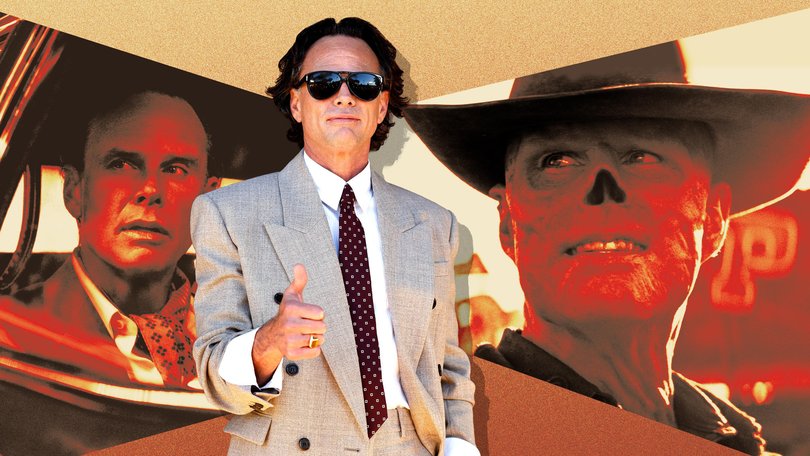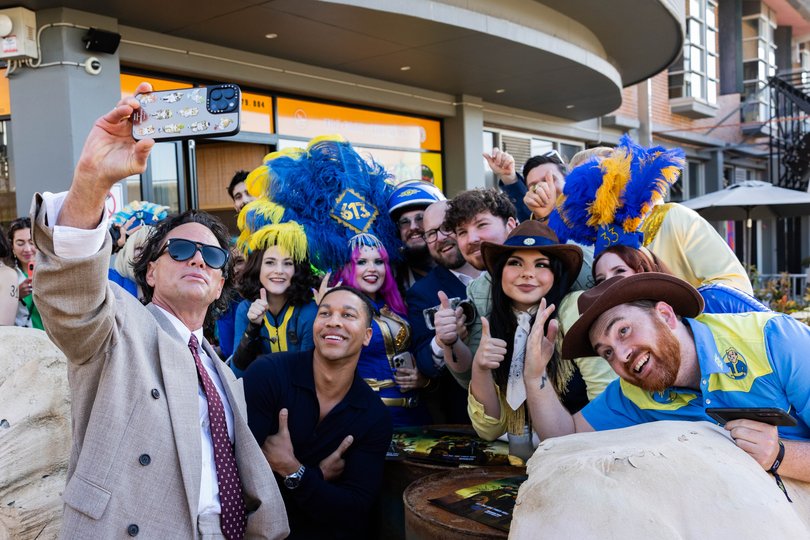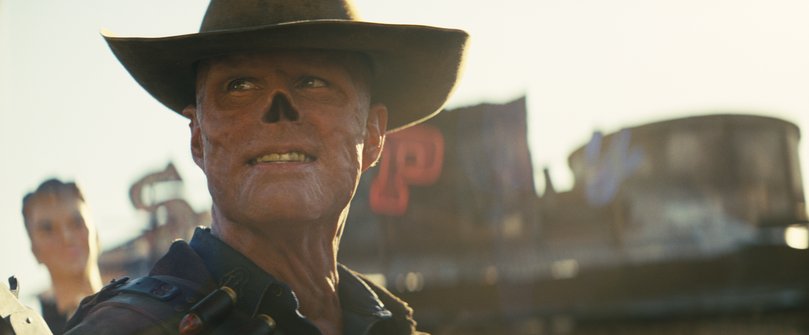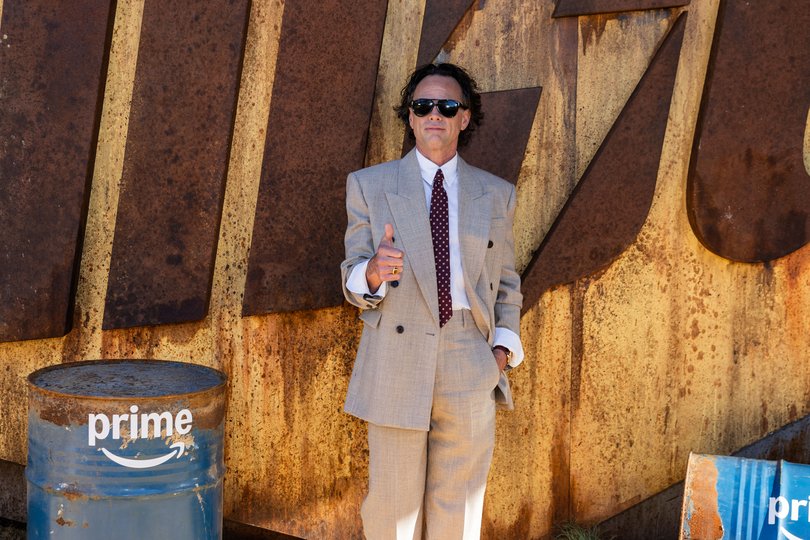Fallout season two: Walton Goggins on playing lonely, hurt people and a chaotic world
The White Lotus’ Walton Goggins returns as The Ghoul, neither a hero nor a villain in a post-apocalyptic world, and wonders why he’s attracted to playing these morally compromised characters.

Walton Goggins doesn’t think of the characters he’s played as “weird”.
How about mercurial then?
“OK, I can stomach mercurial because I think people in general are f—king weird,” he told The Nightly.
Sign up to The Nightly's newsletters.
Get the first look at the digital newspaper, curated daily stories and breaking headlines delivered to your inbox.
By continuing you agree to our Terms and Privacy Policy.“I don’t know that I’ve ever met anyone that isn’t weird, right?”
Mercurial is certainly one way to describe his suite of roles, often loners or outsiders, often prickly, and almost always living in the grey zone of morality and ethics.
Goggins has had quite the 2025 with his stand-out performance in the third season of The White Lotus as the sweaty, sad and self-sabotaging Rick Hatchett, doomed by a great pain he can’t move past.
Next month, he returns as The Ghoul in the second season of Fallout, a character who is neither hero nor villain, not even an anti-hero, yet a perfect encapsulation of the ruthless post-apocalyptic universe he inhabits.
When Fallout premiered in early 2024, it defied expectations as a video game adaptation that not only earned the approval of the fans who have been immersed in its world since 1997 but also won new ones.
The story is set in an alternate history in which technology advanced significantly in the 1950s, and by 2077, there’s a resource war, which resulted in a nuclear war, driving those who could afford it into underground shelters.

Two centuries later, an idealistic bunker dweller named Lucy (Ella Purnell) is forced to the surface in search of her kidnapped father (Kyle MacLachlan), where she discovers a lawless wasteland populated by the few that survived, mutant animals and “post-human” zombie-like creatures called ghouls, that have been irradiated.
Goggins’ character has the distinction of being called THE Ghoul, thanks to his reputation as a bounty hunter. We also met Cooper Howard, the man The Ghoul used to be, who lived before the bombs dropped.
The Ghoul is violent and mercenary, but there is a remnant of Cooper, a latent humanity that persists even in these harshest of climes.
That nuance is where Goggins lives. He did it with Justified’s Boyd Crowder, and he did it with Rick Hatchett. Embodying these characters has given Goggins insight into bad people who do good things and good people who do bad things.
“There is a throughline in my career, even in comedy, of morally compromised, lonely people that hurting,” he said.
“Whether they’re profoundly insecure or had something horrible done to them or they’ve done something horrible to someone else.
“If I weave together a coat out of the fabric of the stories that I’ve been given the opportunity to be a part, it will shadings of colour. I quite like that.
“It’s something that I’m attracted to personally, and in a couple of movies that I’m going to do in the future, in the scripts that I’ve been reading.”

But what he doesn’t know is why he’s so drawn to them. Childhood experiences, probably, life in general, likely.
“I don’t know why any of us are who we are,” Goggins continued. “Environment, for sure. Genetics, for sure. The cup of coffee we had this morning. I don’t know the answer, and I try not to think about it a lot, I just take inventory whenever I need to.”
It’s surprising Goggins doesn’t have more clarity on the question. He’s someone who thinks about the inner lives and past experiences of his characters deeply and innately. He also doesn’t like the word “backstory” because that immediately creates an impression of artificiality to acting.
Instead, he creates in his mind a timeline of critical moments that shape them, and in the case of Fallout, how does Cooper Howard, a generally decent and practical man, become The Ghoul.
“What was it like the first time somebody tried to kill him? What was it like the first time that he killed someone for food, what was it like the moment he said goodbye to his family, if he even got the chance to do that?,” Goggins asked himself.
The specificity of those fictional, imaginary moments is the same as how his experiences makes Goggins who he is.
“I have seminal moments from my childhood, from after working with Quentin (Tarantino in Django Unchained), or moving to Los Angeles or losing a job or whatever those things are,” he explained.
“I’m not the person I was at 20 years old, but do they speak to each other over time? I think so.”

Dystopian fiction has always held fascination for people, and Fallout is far from the only post-apocalyptic series right now. Amid the pure entertainment of gigantic mutant scorpions that want to devour your face or robot suits matched in battle, there is the very real resonance of a world in chaos.
The show doesn’t depict just the fallout, hence the name, but also when the world ends and how it happens.
The first season came out 18 months ago and in the time since, it would be an understatement to say that the feeling of apocalyptic doom has escalated. Whether it’s political division, war or Russian claims it has successfully tested a Burevestnik nuclear-armed missile, we’re all more on edge.
The context in which season two is coming out has shifted, and so will how audiences relate to thematic points such as people and corporations who are unwilling to share or brook pluralism.
“We don’t get into politics on this show. What we’re doing is baked into the DNA of the world of Fallout. We do it with dark humour and satire, but when there are consequences (in the story), there are real consequences,” Goggins said.
“Playing Cooper, going through what he went through, the similarities between him and myself and the people in my community who are like, ‘Well, wait a minute, what is happening in the world right now?’.
“Regardless of your political affiliation, people in general are like, ‘What the f—k is happening?’. In a way, Fallout does mirror that experience unintentionally.
“I just want to keep the world of Fallout fictional.”
Fallout season two is streaming from December 17 on Prime Video

